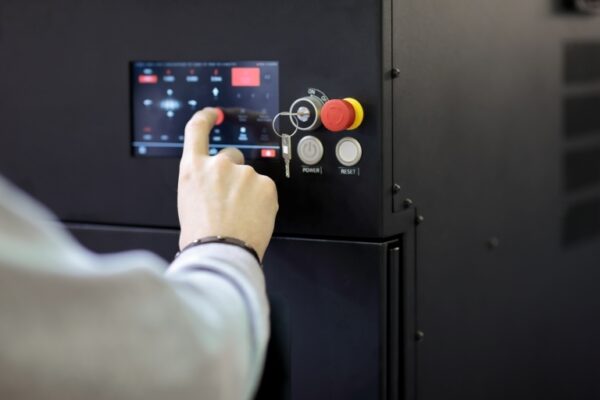
In the constantly changing realm of industrial automation, new technologies are continuously being developed to improve efficiency and simplify processes. One innovation is the HMI touch screen, a crucial tool for connecting human operators with complicated machinery. By revolutionizing input and control processes across various sectors, this technology paves the way for enhanced efficiency and user-centric designs that cater to the dynamic needs of modern industries.
Human-machine interfaces (HMIs) have a long-standing presence in automation, but the advent of touch panel HMIs marks a quantum leap in their evolution. In today’s competitive industrial landscapes, these interfaces have become indispensable.
Not only do they facilitate seamless interactions between humans and machines, but they also simplify operational processes, leading to increased accuracy and faster workflow execution. As industries strive towards higher levels of automation, touch panel HMIs are at the forefront of this transformation, helping organizations achieve greater operational efficiencies and productivity gains.
Key Takeaways
- Discover how touch panel HMIs are transforming industrial workflows.
- Learn practical applications and benefits of implementing these interfaces.
- Understand the future trends influencing HMI technology.
Why Touch Panel HMI Matter
Touch panel HMIs have become essential in industrial settings due to their advantages over traditional mechanical control systems. Eliminating cumbersome switches and dials in favor of intuitive touchscreens provides immediate feedback and allows operators to interact with their machines more naturally. This enhancement in operational efficiency significantly reduces the training time required for employees, as the systems are designed to be more user-friendly and easy to navigate.
Moreover, the increasing complexity of industrial systems necessitates adaptive and responsive management interfaces. A comprehensive overview of industrial automation advancements underscores the critical role of touch panel HMIs in creating modern industrial ecosystems that perform optimally under various conditions. These systems enhance productivity by enabling operators to make informed decisions quickly and efficiently through real-time data visualization and control.
How Touch Panel HMI Improves Operational Efficiency
The practical benefits of touch panel HMIs are most evident in real-world scenarios. Manufacturing, automotive, and process industries have capitalized on these systems to boost productivity and uphold stringent quality control standards. Touch panel HMIs facilitate rapid adjustments in production lines, minimizing downtime and optimizing resource allocation by allowing real-time data access and instant feedback mechanisms.
Numerous case studies, such as those exploring the practical applications of HMIs, demonstrate these devices’ transformative effects across various sectors. From accelerating assembly lines to minimizing errors in critical processes, touch panel HMIs redefine operational excellence by integrating cutting-edge technology with everyday industrial procedures.
Customization and Scalability in Modern HMIs
One of the standout features of modern touch panel HMIs is their ability to offer customizable interfaces, which can be tailored to meet the specific needs of different industries. Whether for small manufacturing units or expansive industrial operations, these systems can be precisely configured to meet unique operational requirements. This flexibility ensures businesses can scale their operations without requiring significant technological overhauls, allowing them to adapt swiftly to changing market demands.
Moreover, as these businesses grow and evolve, the scalability of touch panel HMIs ensures that they continue to support and enhance operational efficiencies. Adapting successfully is crucial to staying ahead of rivals in a fast-changing industrial landscape, where ongoing innovation and enhancements are vital for staying competitive.
Innovative Features of Next-Gen HMIs
Today’s touch panel HMIs have groundbreaking features that enhance their applicability across industries. For instance, multi-touch support enables complex operations to be executed effortlessly, while advanced real-time data analytics provide valuable insights that help drive efficiency. Additionally, remote accessibility allows operators to control systems from various locations, ensuring uninterrupted productivity and flexibility in operations.
These interfaces are designed to be user-friendly, highlighting simplicity and clarity crucial for managing complex industrial systems by providing operators with precise, easily interpretable data and controls; touch panel HMIs make sure that technology continues to be a facilitator rather than a hindrance, allowing users to utilize their features efficiently without needing extensive training.
Challenges and Considerations in Implementing Touch Panel HMIs
Despite their numerous benefits, implementing touch panel HMIs comes with its own set of challenges. Potential issues include cybersecurity concerns, integration costs, and the necessity for comprehensive user training. To mitigate these challenges, companies must invest in robust security measures, ensure ample resources are allocated for system integration, and provide detailed, ongoing training programs for their employees.
By adopting strategic planning and addressing these challenges head-on, companies can ensure a smooth transition to touch panel HMI systems, ultimately reaping significant benefits regarding operational efficiencies and competitive advantages in the market.
The Future of Touch Panel HMIs in Industrial Automation
The future of touch panel HMIs is bright, with evolving trends such as artificial intelligence integration, virtual reality support, and IoT connectivity set to redefine their capabilities. These advancements promise to enhance HMIs’ functionalities, making them even more integral to industrial operations as they strive for greater automation and interconnectedness.
As industries prepare for these technological advancements, particularly in HR and production departments, ongoing investment in research and development of HMI technologies will be crucial. Embracing these innovations will allow businesses to remain competitive in an ever-evolving industrial landscape and lead it.
Conclusion
In conclusion, touch panel HMIs are pivotal in modernizing industrial operations. As these systems evolve, their capacity to improve efficiency and adapt to new technological challenges will only grow. Industries aiming to maintain a leading edge in the age of automation must explore and invest in touch panel HMIs, recognizing that in doing so, they’re not just embracing current innovation but paving the way for future growth and success.